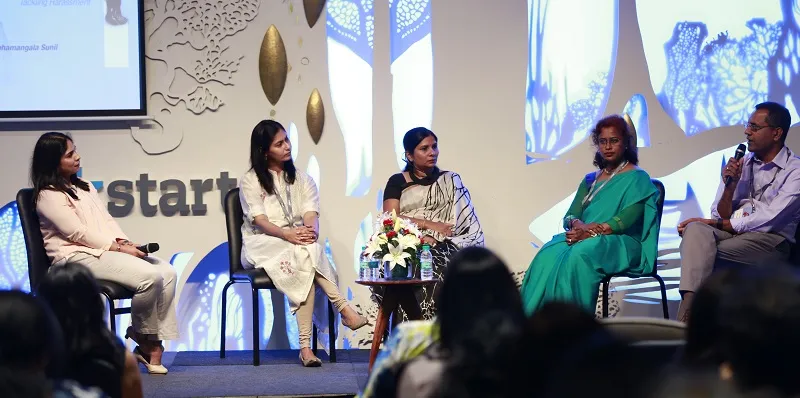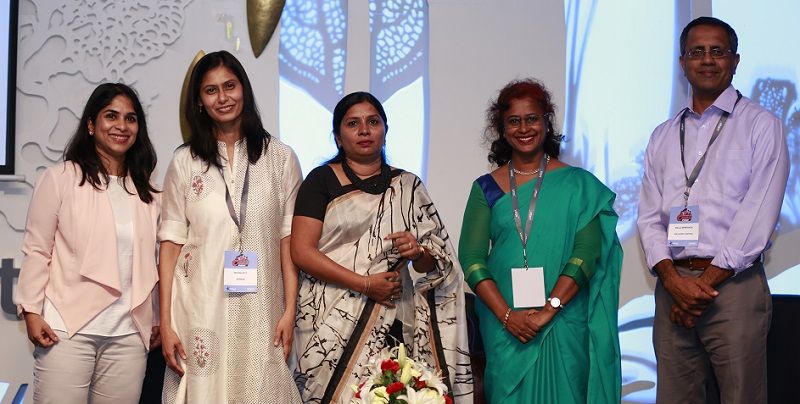The ground realities of dealing with sexual harassment at workplace: experts speak
Sexual harassment at workplace is a taboo of a topic even in the 21st century. Women are flying rockets in this world, but rarely dare to come out and talk about being harassed at workplace. Even harder it is for men in such a situation.
Conversations are the beginning to any movement. YourStory and Kalaari Capital came together, with ‘TogetherForChange’, an event that saw active participation from men and women on the topic of sexual harassment at workplace.

Talking about ground realities, at the ‘Feet on the Ground’ session moderated by Ramya Venugopal, Executive Editor at YourStory Media, were Serein Founder Ishani Roy, Kalaari Partner Bala Srinivasa, former Intel lawyer Sharda Balaji, Cyber Security Response Team Founder Shubhamangala Sunil.
Cultural issue
The most basic question is: What constitutes sexual harassment? How does one know? Ishani puts it simply – “We don’t. Mostly you are harassed, not sexually. We think physical is the only form, but sexist jokes are also sexual harassment – even on SMS, WhatsApp, or email messages.” She believes that it is an issue of culture at the company. When ‘bro culture’ with a certain lingo prevails, it brings in an environment where aggression becomes part of the company’s DNA.
Also read: Are urban Indian women taking after their Japanese counterparts and shying away from motherhood?
Often, the problem arises when people do not want to be construed as ‘killjoy’ by calling someone out for their sexist remark. If the crowd that is the life of the party makes a sexist joke, most people tend to laugh it off rather than react. “If it is hard for women, it is harder for men. People who talk and behave like that don’t think of consequences. They often become intrusive to attract attention,” Ishani adds. She reiterates that we should call each other out if there is a sexist joke.
In the case of startups, entrepreneurs and employees who are right out of college may not even understand the relevance of the topic. But Bala says that investors can put emphasis on this from the board level. “What should a harassed employee expect from HR? If they are to get in touch as soon as something happens, there needs to be a formal understanding on how it works on each level. Raising the issue has to be encouraged; the board should be mandating this,” he said.

Legal recourse
What are the steps for a victim who has left the company? In the unorganised sector, there is a local complaints committee, and the complainant can directly go to the District Collector. But things are, ironically, harder in the organised sector. Although corporates usually have a process in place as per the Sexual Harassment of Women at Workplace (Prevention, Prohibition and Redressal) Act, 2013 and Vishakha Guidelines, often they are just perfunctory.
Sharda points to a larger issue. “Culturally, women find it hard to talk about sexual harassment. The need of the hour is to sensitise the whole organisation about the company policy; that makes it easier for women to talk about it, even if anonymously. A victim should know who to go and talk to. Companies should visibly state it on a notice board or at the cafeteria,” she says.
Also read: Cutting, but no pasting: How Adhuna Bhabani took BBLUNT to beyond 1 million haircuts
The thought process behind victims' hesitance to come out and speak about harassment is simple. Ishani says, “We can’t even come to terms with the fact that it is happening to us; so how will you to go to someone to complain? Employees should feel safe enough to come and talk to the founder if need be, under the promise of confidentiality.”
Online crimes
Most difficult to prevent is cyber sexual harassment. Hacking is only one part of it, says Shubha. “Cyber crimes have no limits in geography; anybody can harass you. Tech is growing every second, so there is a new crime every second. We are still victims due to lesser awareness,” she adds.
According to her, activities on social media also give out a lot of information that can be used against us. “Getting your phone number and other details is easy, even from a recharge shop, food outlets, malls, health and pharmaceuticals, ticket booking counters –wherever you end up sharing data,” Shubha adds.
But laws against this issue are strong and sensitive. Sharda says that FIR is not the only way to sort it out. “Once the court makes an order, the company has to do it. It goes into the Director’s report, and they have to report it to the District office annually,” she points out.
Additionally, POSH Act lets anybody file a complaint anywhere, but it can take up to one week to file a complaint. Sharda also warns that the process of collecting evidence can itself become another form of harassment to the victim. “Police needs to be trained and sensitised,” she adds.
The world out there can be scary. But standing up against the fear might be the beginning of change. And standing together is the right way for change.











